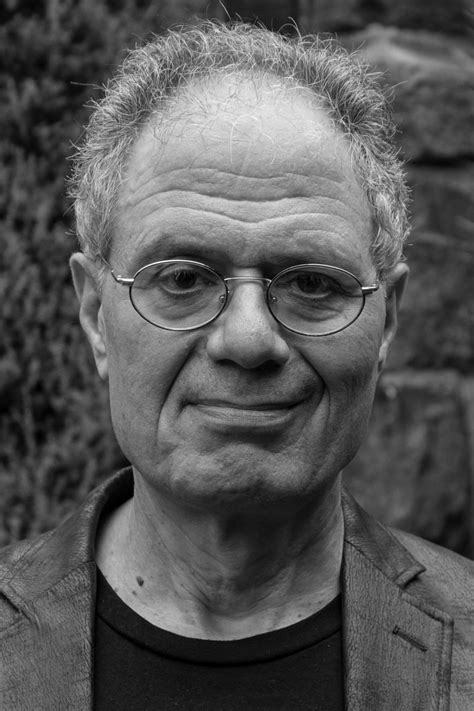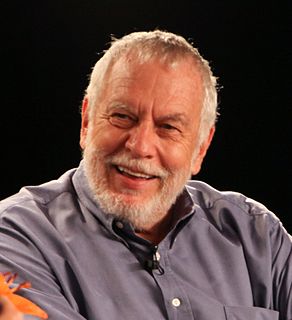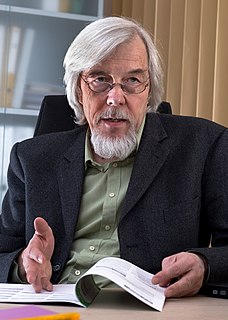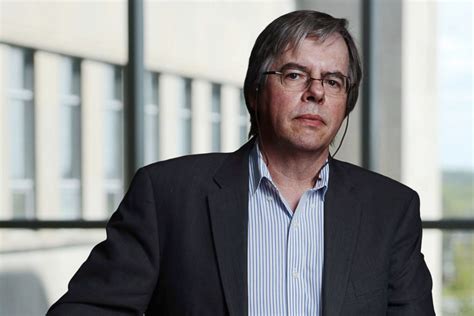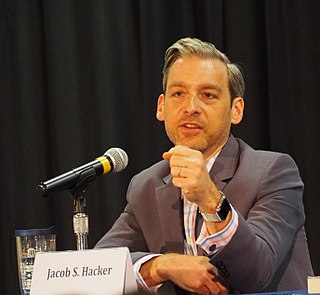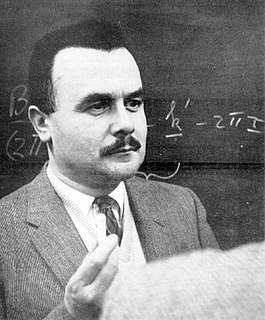Top 1200 Technological Advancement Quotes & Sayings - Page 20
Explore popular Technological Advancement quotes.
Last updated on April 15, 2025.
I will continue to work for the advancement of freedoms in Egypt and the Arab world until I drop dead... Education itself - which can and should play an important role in the apprenticeship of tolerance and respect for other people -sometimes encourages identitarian closure, or even extremist behaviour... It is therefore vital to ensure that education does not encourage rejection of other people or identitarian closure, but that on the contrary it encourages knowledge and respect for other cultures, other religions and other ways of being and living.
Modernity is the ensemble of changes - intellectual, political, economic, social, cultural, technological, aesthetic - that have altered the world drastically since roughly the 17th century, until which time the world was, in the above respects, far less different from the world of any previous epoch of recorded history than it is from the world of today. The modern predicament is the set of problems these changes have bequeathed us.
Atari always was a technology-driven company, and we were very keen on keeping the technological edge on everything. There's a whole bunch of things that we innovated. We made the first computer that did stamps or sprites, we did screen-mapping for the very first time, and a lot of stuff like that. We had some of the most sophisticated sound-creating systems, and were instrumental in MIDI.
Today, women have access to the technological capacity to do anything to our bodies in the struggle for "beauty", but we have yet to evolve a mentality beyond the old rules, to let them imagine that this combat among women is not inevitable. Surgeons can now do anything. We have not yet reached the age in which we can defend ourselves with an unwillingness to have "anything" done. This is a dangerous time. New possibilities for women quickly become new obligations.
Scientists tell us that we have enough technology to save our planet. . . . Yet we don't take advantage of this new technology. . . . The technological has to work hand-in-hand with the spiritual. Our spiritual life is the element that can bring about the energies of peace, calm, brotherhood, understanding, and compassion. Without that, our planet doesn't stand a chance.
Now it is the least developed world who are not responsible for this climate change phenomenon that bore the brunt of climate change consequences so it is morally and politically correct that the developed world who made this climate change be responsible by providing financial support and technological support to these people.
In volume and velocity, the new media are making available testimony on a previously unimaginable scale. I'm neither as romantic about the new media landscape, nor cynical. But what's indisputable is the experimental energy that digital forms are unleashing. Among my students and among up-and-coming artists, I find myself startled by the creative responses to the technological, environmental, and political upheavals of our time.
We do not assert that the capitalist mode of economic calculation guarantees the absolutely best solution of the allocation of factors of production. Such absolutely perfect solutions of any problem are out of reach of mortal men. What the operation of a market not sabotaged by the interference of compulsion and coercion can bring about is merely the best solution accessible to the human mind under the given state of technological knowledge and the intellectual abilities of the age's shrewdest men.
I think it is time we learned the lesson of our century: that the progress of the human spirit must keep pace with technological and scientific progress, or that spirit will die. It is incumbent on our educators to remember this; and music is at the top of the spiritual must list. When the study of the arts leads to the adoration of the formula (heaven forbid), we shall be lost. But as long as we insist on maintaining artistic vitality, we are able to hope in man
Geneva has a long history of hosting international organizations, which is part of the reason why CERN is here. CERN has signed agreements with the ITU, WIPO and the WMO. At first sight, there may not seem to be much common ground between CERN and, say, the World Meteorological Organization, but scratch the surface, and you'll soon find a common thread. All of these organizations have a vocation to stimulate technological innovation, and together we're stronger.
What is the appeal of Trump, really? It's nostalgic: "Make America great again." Like European nationalists, he has a vision of a "real" America, one which predates globalization, immigration, feminism, the civil rights movement and technological change, an imaginary 1950s to which we can now return. That is actually not very different from the kind of language that Marine Le Pen uses, or parts of the Brexit movement.
Nowadays, it is possible to perform various forms of Low-Impact listening via the telephone. The advent of technological advances such as computer games and online services (like ones that let you check stocks) have enabled Low-Impact listeners to endure family phone calls much longer than in the past. Dangers include mouse clicks, heavy typing, or a sudden loud buzzer that goes off when you have finished Boggle.
The technological landscape of the present day has enfranchised its own electorates - the inhabitants of the marketing zones in the consumer society, television audiences and news magazine readerships, who vote with money at the cash counter rather than with ballot paper at the polling boot. These huge and passive electorates are wide open to any opportunist using the psychological weaponry of fear and anxiety, elements that are carefully blanched out of the world of domestic products and consumer software.
Television thus illustrates the mixed blessings of technological change in American society. It is a new medium, promising extraordinary benefits: great educational potential, a broadening of experience, enrichment of daily life, entertainment for all. But it teaches children the uses of violence, offers material consumption as the answer to life's problems, sells harmful products, habituates viewers to constant stimulation, and undermines family interaction and other forms of learning such as play and reading.
We need to know who's in the United States. We need to know everyone who's in the United States that comes in here from a foreign country. And we have to separate the ones who are dangerous from the ones who aren't. To accomplish that, we need a fence. We need a technological fence. We need a border patrol.
It [RESIDENT EVIL: AFTERLIFE] has definitely been the biggest learning curve for me. As an actor, whenever I start on a movie, different things that I perform in ask for different skill sets. And this one is definitely the technological side of it. You have to hit your mark. You can't weave back and forth because your nose is jutting at you in 3-D. It's really been learning how to do that and also it's exciting to be on the forefront of this technology.
Avatar is the most high tech film in terms of its execution, dealing with essentially a very low tech subject; which is our relationship with nature...and in fact the irony is that the film is about our relationship with nature and how our technological civilization has taken us several removes away from a truly natural existence and the consequences of that to us.
I discovered, to my amazement, that all through history there had been resistance ... and bitter, exaggerated, last-stitch resistance ... to every significant technological change that had taken place on earth. Usually the resistance came from those groups who stood to lose influence, status, money...as a result of the change. Although they never advanced this as their reason for resisting it. It was always the good of humanity that rested upon their hearts.
The human species does not necessarily move in stages from progress to progress ... history and civilization do not advance in tandem. From the stagnation of Medieval Europe to the decline and chaos in recent times on the mainland of Asia and to the catastrophes of two world wars in the twentieth century, the methods of killing people became increasingly sophisticated. Scientific and technological progress certainly does not imply that humankind as a result becomes more civilized.
The modern welfare state, highly touted as soaking the rich to subsidize the poor, does no such thing. In fact, soaking the rich would have disastrous effects, not just for the rich but for the poor and middle classes themselves. For it is the rich who provide a proportionately greater amount of saving, investment capital, entrepreneurial foresight, and financing of technological innovation that has brought the Unites States to by far the highest standard of living - for the mass of the people - of any country in history.
The industrial-technological system may survive or it may break down. If it survives, it MAY eventually achieve a low level of physical and psychological suffering, but only after passing through a long and very painful period of adjustment and only at the cost of permanently reducing human beings and many other living organisms to engineered products and mere cogs in the social machine.
If man--if each one of us--abdicates his responsibilities with regard to values; if each one of us limits himself to leading a trivial existence in a technological civilization, with greater adaptation and increasing success as his sole objectives; if we do not even consider the possibility of making a stand against these determinants, then everything will happen as I have described it, and the determinates will be transformed into inevitabilities.
In many places, above all in the Anglo-Saxon countries, logistics is today considered the only possible form of strict philosophy, because its result and procedures yield an assured profit for the construction of the technological universe. In America and elsewhere, logistics as the only proper philosophy of the future is thus beginning today to seize power over the intellectual world.
I'm working with wind, solar, and biofuels companies as well as with organizations like ACORE [American Council On Renewable Energy], Growth Energy, and AREDAY to raise public awareness and seek practical technological solutions to reduce our reliance on fossilized carbon. My book Don't Wait for the Next War will be out in October, where I will offer my prescription for America's growth, responsible development, and security.
In a culture of electronic violence, images that once caused us to empathize with the pain and trauma of another human being, excite a momentary adrenaline rush. To be numb to another's pain - to be acculturated to violence - is one of the worst consequences our technological advances. That indifference transfers from the screen, TV, film, Internet, and electronic games to our everyday lives.
Perhaps, some day, humanity can start afresh, a new world, a tabula rasa, a world with a mind without prior experiences. No memories and no pain. A day when the ones with abundance do not look down at the poor and the needy, a day when we learn to care for the victims, the fallen souls of civilization and advancement, a day when the world will be pure. When all of humanity becomes a clean sheet of parchment, without knowledge and prejudice, simple, hungry for knowing, tasting, and feeling; hungry for life and ready to absorb the ink of experience.
While the rich reap most of the benefits of technological development, the poor bear an unequal burden of dealing with the consequences of the resulting increased pollution. The poor continue to live in greatest proximity to the sources of pollution, the infrastructure and machinery of industry. They work in the most polluted and physically dangerous workplaces. And these same individuals, living and working closest to the sources of environmental catastrophe, are also the ones most lacking decent health care.
James says, "You desire and do not have; so you kill" (Jas. 4:2). We kill marriages and we kill unborn babies because they cut across our desires; they stand in the way of our unencumbered self-enhancement. And we live in a culture where self-enhancement and self-advancement is god. And if self-enhancement is god, then the One who is at work in the womb shaping a person in His own image is not God and the assault on His work is not sacrilegious, but obedience to the god of self.
We may feel bitterly how little our poems can do in the face of seemingly out-of-control technological power and seemingly limitless corporate greed, yet it has always been true that poetry can break isolation, show us to ourselves when we are outlawed or made invisible, remind us of beauty where no beauty seems possible, remind us of kinship where all is represented as separation.
Before I became President, in the aftermath of the Vietnam War, there had been fairly dramatic, and I think excessive, reductions in the capability of our military forces, and as a former military man myself - I was a professional naval officer, a submarine officer - I thought it was better, on a step-by-step, very carefully planned way, to increase the technical, or technological, capability of our weapons systems.
The oppressive weight of disaster and tragedy in our lives does not arise from a high percentage of evil among the summed total of all acts, but from the extraordinary power of exceedingly rare incidents of depravity to inflict catastrophic damage, especially in our technological age when airplanes can become powerful bombs. (An even more evil man, armed only with a longbow, could not have wreaked such havoc at the Battle of Agincourt in 1415.)
While the emphasis on effects became a catastrophe for science fiction, it was a relief for the capitalist culture of which 'Star Wars' became a symbol. Late capitalism can't produce many new ideas any more, but it can reliably deliver technological upgrades. But 'Star Wars' didn't really belong to the science fiction genre any way.
We need a more widely shared burden on the part of society to keep asking, "What are our collective values, what kind of world do we want to bequeath to our children, and to what extent are these particular technological developments helping us go in those directions? I think that corporations, every bit as much as governments, social movements, and universities - we all have a role to play in asking those questions. I don't think anybody should have a monopoly on that responsibility.
The incredible story of progress that is America has always been built by those who ask why, what if, and why not. Our schools must begin instilling that wonder in our children again so that their generation will unite around the next great project of our time, whether it be declaring America energy independent or launching the next great technological revolution.
Despite the Internet 's origin in the late 1960s as a government sponsored means of communication between the Department of Defense, private industry, and academia, it has been at its best and generated the greatest economic, social, and technological benefits since it was 'liberated' by the hordes of 'geeks' who were originally hired to run it by employers who were not themselves conversant with computers, and couldn't tell when their employees were exchanging official traffic or trading dirty jokes and recipes for marijuana brownies.
If we hope to stem the mass destruction that inevitably attends our economic system (and to alter the sense of entitlement - the sense of contempt, the hatred - on which it is based), fundamental historical, social, economic, and technological forces need to be pondered, understood, and redirected. Behavior won't change much without a fundamental change in consciousness. The question becomes: How do we change consciousness?
Technological revolutions are very hard to predict. My favourite example is someone in 1850 taking care of horses as a farrier. They would have said, "Look, horses have been part of human existence for 5,000 years. We are horse people. It's permanent." But all of a sudden, the internal combustion engine comes along and, with it, oil fields and automobiles, which basically replace the horse completely. So we often have these long periods of stability and then a sudden inflection point.
The widespread inability to understand technological artifacts as fabricated entities, as social and cultural phenomena, derives from the fact that in retrospect only those technologies that prove functional for a culture and can be integrated into everyday life are 'left over.' However, the perception of what is functional, successful and useful is itself the product of social and cultural--and last but not least--political and economic processes. Selection processes and abandoned products and product forms are usually not discussed.
Through scientific discovery and technological innovation, we enlist the forces of the natural world to solve many of the uniquely human problems we face - feeding and providing energy to agrowing population, improving human health, taking responsibility for protecting the environment and the global ecosystem, and ensuring our own Nation's security. Scientific discoveries inspire and enrich us, teaching us about the mysteries of life and the nature of the world.
In a world facing the revolt of ragged and hungry masses of God's children; in a world torn between the tensions of East and West, white and colored, individuals and collectivists; in a world whose cultural and spiritual power lags so far behind her technological capabilities that we live each day on the verge of nuclear co-annihilation; in this world, nonviolence is no longer an option for intellectual analysis, it is an imperative for action
It is no coincidence that a rebirth of psychedelic use is occuring as we acquire the technological capability to leave the planet. The mushroom visions and the transformation of the human image precipitated by space exploration are spun together. Nothing less is happening than the emergence of a new human order. A telepathic, humane, universalist kind of human culture is emerging that will make everything that preceded it appear like the stone age.
Fruits are always of the same nature with the seeds and roots from which they come, and trees are known by the fruits they bear: as a man begets a man, and a beast a beast, that society of men which constitutes a government upon the foundation of justice, virtue, and the common good, will always have men to promote those ends; and that which intends the advancement of one man's desire and vanity, will abound in those that will foment them.
If you look at how the US economy has suffered over the last 15 or 20 years, it's in significant part because we haven't done the investments in research and development and infrastructure and other public goods that are necessary for our growth. And, unfortunately, we're going to be feeling that overhang for a long time to come, because it's the investments we made in the 1950s and '60s and '70s that result in some of the greatest technological breakthroughs that we enjoy today.
Here's what I do believe very strongly: that once capitalism comes into existence, once it creates this mythology of a stingy nature, then that myth has to be exorcised. In other words, we have to get out of people's heads the idea that without a market economy, without egotism, competition, rivalry and self-interest, without all the technological advances that [Karl] Marx imputed to capitalism, we have to eliminate the feeling that we would sink into some kind of barbarism.
If we do not learn to eliminate waste and to be more productive and more efficient in the ways we use energy, then we will fall short of this goal [for the Nation to derive 20 percent of all the energy we use from the Sun, by 2000]. But if we use our technological imagination, if we can work together to harness the light of the Sun, the power of the wind, and the strength of rushing streams, then we will succeed.
There has always been a longing in the human heart for a more just, free, loving and creative society. But it was never before possible to fulfill these aspirations, because we had neither the evolutionary drivers and global crises to force us to change, nor did we have the scientific and technological powers that can free us from the limitations of scarcity, poverty, disease, and ignorance. This is the time of awakening for the social potential movement.
Kyoto is dead and has been dead, but that doesn't mean that it hasn't done some real damage and won't continue to do some real damage," "If global warming turns out to be a problem, which I doubt, it won't be solved by making ourselves poorer through energy rationing." "It will be solved through building resiliency and capability into society and through long-term technological innovation and transformation.
As agonizing a disease as cancer is, I do not think it can be said that our civilization is threatened by it. ... But a very plausible case can be made that our civilization is fundamentally threatened by the lack of adequate fertility control. Exponential increases of population will dominate any arithmetic increases, even those brought about by heroic technological initiatives, in the availability of food and resources, as Malthus long ago realized.
North Korea continues to advance its nuclear technology and will soon reach weaponization. Regarding its intercontinental ballistic missiles, it is continuously making progress. So currently, it is urgent for us to freeze North Korea's program so they will stop additional provocations and stop advancement of its technologies. I believe during my upcoming summit meeting in the U.S. I will be able to discuss a two-phased approach to the North Korean nuclear issue - the first being a freeze and the second being complete dismantlement.
To invoke a Kierkegaardesque figure of speech, the beauty of the language of the Bible can be like a set of dentist's instruments nearly laid out on a table and hanging on a wall, intriguing in their technological complexity and with their stainless steel highly polished--until they set to work on the job for which they were originally designed. Then all of a sudden my reaction changes from "How shiny and beautiful they all are!" to "Get that damned thing out of my mouth!
As for comics, one has only to turn to the characteristic output of Marvel Comics, for the period from about 1961 to about 1975, to find not an expression of base and cynical impulses but of good, old-fashioned liberal humanism of a kind that may strike us today, God help us, as quaint, but which nevertheless appealed, in story after story, to ideals such as tolerance, technological optimism, and self-sacrifice for the benefit of others.
It should be for satsang that we go to spiritual centers. By going there, people who are involved in the world can attain peace and concentration. The concentration gained when one goes there cannot be achieved if one sits at home. Even though the breeze blows everywhere, coolness will be felt more if we sit in the shade of a tree. In the same way, although God is all-pervading, this presence will clearly shine in certain places more than others. That is the greatness of satsang. Satsang is the best thing for spiritual advancement.
Some people think it's a law that when productivity goes up, everybody benefits. There is no economic law that says technological progress has to benefit everybody or even most people. It's possible that productivity can go up and the economic pie gets bigger, but the majority of people don't share in that gain.
For strictly scientific or technological purposes all this is irrelevant. On a pragmatic view, as on a religious view, theory and concepts are held in faith. On the pragmatic view the only thing that matters is that the theory is efficacious, that it 'works' and that the necessary preliminaries and side issues do not cost too much in time and effort. Beyond that, theory and concepts go to constitute a language in which the scientistic matters at issue can be formulated and discussed.
At what point, 2,000 years on from the life of Jesus, do we need a refresher course? Another 2,000 years? Imagine 100,000 years’ time – would the story of Moses’ burning bush amaze a generation laden with unimaginable scientific and technological wonders? Here lies religion’s biggest quandary. While science is squeezing the life out of God, how is religion going to muster a counterattack from here?


